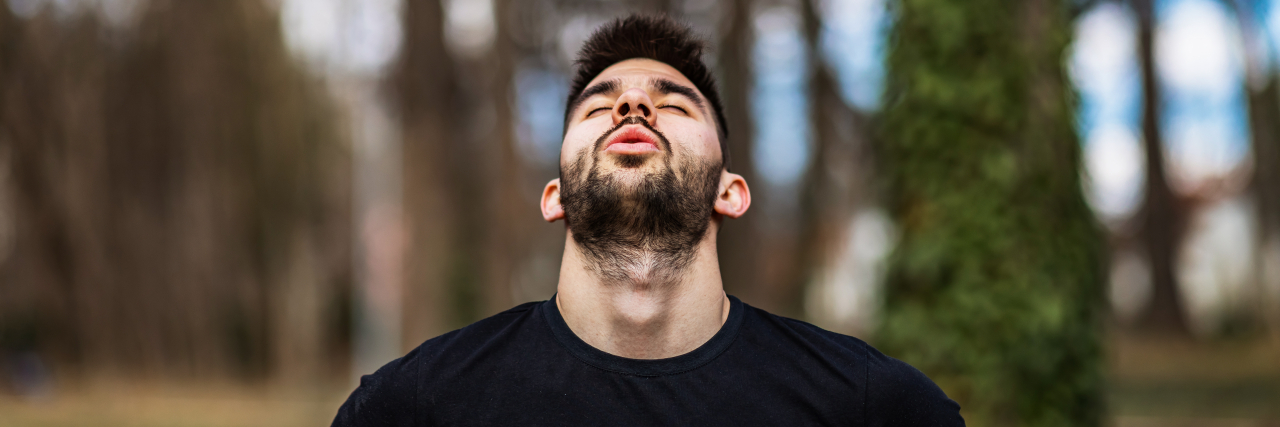How I Cope With Unexpected Triggers in My Life With PTSD
Editor's Note
If you’ve experienced sexual abuse or assault, the following post could be potentially triggering. You can contact The National Sexual Assault Telephone Hotline at 1-800-656-4673.
Recently, I was watching the movie “A Few Good Men,” which was a favorite of mine even before I joined the Army. It has good acting and a good twist-and-turn storyline. The plot of the movie centers around the trial of two Marines who participated in a hazing incident in which they were ordered to put a tainted rag down a weaker Marine’s throat and then tape his mouth shut. As I watched an actor describing in full detail what had happened, in my mind, I was transported back to a night in the desert when I was in the army, and I had a similar experience.
I try not to dwell on this traumatic event in my life, but as I watched the movie, I relived my horrifying experience from the Mojave Desert. I quickly turned off the television, but the thoughts of my own encounter came roaring back, and I found myself experiencing the incident all over again.
Even when my trauma first happened, it was so profound that I did not know how to manage it. Being taped up was the last thing I thought I would go through during my Army experience. Racing thoughts and a mountain of anxiety came next. I felt the tight restraint of duct tape being wrapped around my body until I was lying on the ground — unable to move in any direction to defend myself against my fellow soldiers. The duct tape was strapped across my mouth, and I was having difficulty breathing. I remember thinking, “How could this be happening to me?” I was sure I was experiencing the last moments of my life. My parents flashed through my mind. Would they ever know the truth about what had happened to me in this desolate, lonely place?
I now know that seeing the hazing incident in this movie brought about a post-traumatic stress disorder (PTSD) flashback, not from combat, but from reliving a very traumatic incident in my own life. I looked down at the bracelet on my left wrist. It had the phone number of the veterans’ crisis line.
I also remembered that I had planned and prepared for a situation like the one I was experiencing at the moment. Due to my diagnosis of schizoaffective disorder, I had a routine I could follow on stressful days. On days like the one I was going through, I knew keeping to my routine was crucial. With the past weighing heavily on my entire body — the part of my body that had been taped — I still had to move forward for the rest of the day. My daily routine was the only way I could move on.
I began by having coffee while listening to uplifting music. I brushed my teeth too. Those two small steps made me proud that I had at least begun my daily routine. However, I still had the rest of the day to get through. In “survival mode,” all I had was my routine.
I had not had an episode like this in months. Next, I called my mom, which was also a part of my daily routine. She has always been my go-to for advice. When I deal with anxiety and my symptoms of schizophrenia, I wonder what I would do if I did not have my parents — who are my trusted partners in my mental health journey.
My mom gave me what I call “sensory therapy.” She asked me to use my senses to tell her what was going on around me.
My mom asked me, “What do you see?”
“My neighbor in his convertible, driving in the parking lot.” I answered.
I then went on to say, “I see a breeze blowing the palm trees. I love that I live in a place where there are palm trees.”
She asked me to close my eyes and tell her what I could hear: a dog barking, traffic out on the highway, seagulls squawking. By doing this, I felt enlightened and in touch with what is real and what is happening around me. Her voice made me feel safe, and I knew I was not back in the desert.
I told mom I was looking forward to my exercise for the day because it would start to get rid of this full-body anxiety. She told me to call her after my exercise just to check in.
Exercise is a regular part of my daily routine — I do it six times a week. Without exercise, racing thoughts and anxiety would probably fester inside my mind. Exercise not only burns off my energy, but it also burns away excessive thinking and worrying.
Watching an intense movie became a trigger for me — even though I consider myself to be in recovery. I relearned that having a routine is crucial to distract myself from thinking I have no control. In the end, I had my action plan: my routine, my self-care, and my “trust partner.” All of these things are imperative for succeeding in my mental health journey.
Getty image by RealPeopleGroup.

